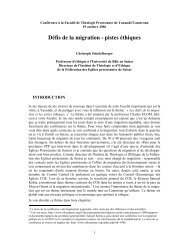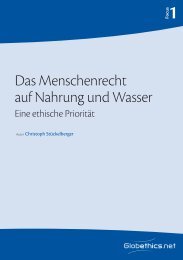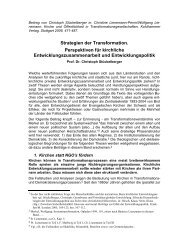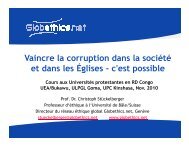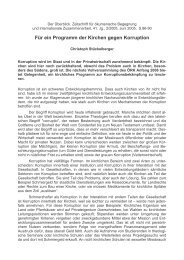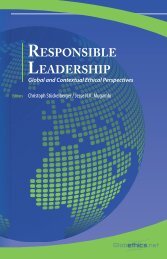BREAK THE CHAINS OF OPPRESION AND THE YOKE OF ...
BREAK THE CHAINS OF OPPRESION AND THE YOKE OF ...
BREAK THE CHAINS OF OPPRESION AND THE YOKE OF ...
Create successful ePaper yourself
Turn your PDF publications into a flip-book with our unique Google optimized e-Paper software.
PREAChing come aware of how abundantly you have been blessed, the more you will discover<br />
that you do not live from a position of scarcity, but from a position of<br />
abundance. In his preaching, Jesus picks up on the pastoral guidance contained<br />
in the Psalms, which also act as encouragement to trust in God through recalling<br />
the goodness of God: “Bless the Lord, o my soul, and do not forget all his<br />
benefits” (Ps 103).<br />
One particularly striking example of such healing pastoral care is found in the<br />
Jewish passover liturgy. One of the songs sung during the celebration lists, one<br />
by one, all the good things that God has given to his people, and after the naming<br />
of each individual deed, the refrain is: “It would have been enough.” Thus: If<br />
God had only led us out of Egypt – it would have been enough. And so it continues:<br />
if he had only defeated the Egyptians – it would have been enough. And<br />
if he had only parted the sea, it would have been enough. And led us through the<br />
sea, enough. And provided for us in the desert, enough – and so on. Each individual<br />
deed in the history of salvation is individually praised as a gift from God,<br />
with the words “it would have been enough” – in Hebrew “dajjenu” – being constantly<br />
repeated: it would have been enough, it would have been enough, it<br />
would have been enough, enough, enough.<br />
After Accra, our basic task in preaching, and simultaneously our unmistakable<br />
Christian contribution is to keep making new attempts to tell about the justice<br />
of God and to offer it to our listeners as free grace so that despite all their fears<br />
and hardship they will become aware of their wealth; despite all their weaknesses<br />
they will become aware of their God-given power (cf. 2 Cor 6:3ff.; 12:9) and<br />
so become willing and able to stand up to injustice.<br />
Exposing the �others’ � injustice � and our �injustice �<br />
In the light of the justice of God, the “works of darkness” (Eph 5:11ff.) become<br />
evident. That is why preaching about justice also means exposing injustice and<br />
calling it by name. From the perspective of the AC, the main focus is on the economic<br />
and ecological injustice, which, in paragraphs 5 to 14, is described as the<br />
consequence of the neoliberal globalization, and which in the confession section,<br />
in the light of the statements of faith, is decisively rejected.<br />
The sermon will have to take up the criticism and the clear rejection of an economic<br />
system that operates in a way that is anti-human and anti-nature. But it is<br />
also true here that it must be concretized and extended in its own particular context.<br />
Above all, it must be simplified into its elementary structures, so that it can be<br />
understood and accepted. For, ultimately, the aim of this part of the sermon is to<br />
keep the congregation away from the false path or to find them guilty of their sin<br />
(i.e., their following the wrong path). A few comments on this:<br />
1. Martin Luther translates Lamentations 3:39: “Why are the people complain-<br />
��������������������������������������������<br />
� � � ��������������������<br />
�<br />
�<br />
– PREACHING ON JUSTICE – 17



